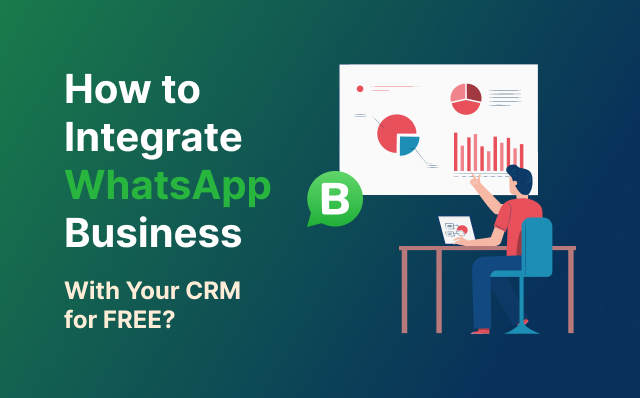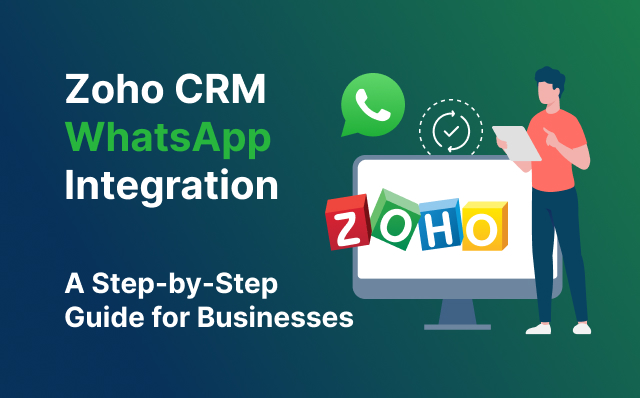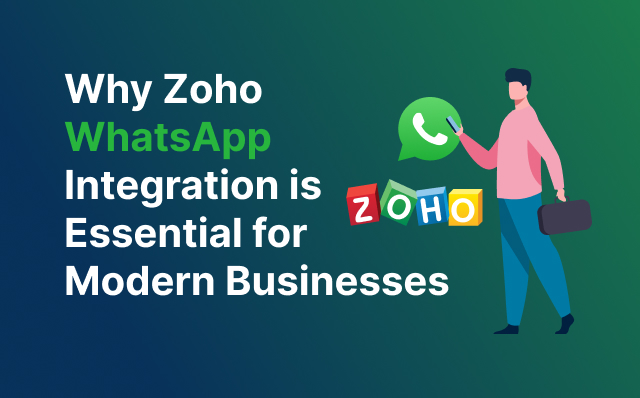In today’s competitive landscape, businesses need seamless communication with their customers to build stronger relationships and streamline operations. Integrating WhatsApp Business with your CRM is a powerful way to unify customer interactions and manage leads efficiently. Best of all, you can do this without incurring significant costs if you follow the right strategy.
In this blog, we’ll guide you through how to integrate WhatsApp Business with your CRM for free, its benefits, and the tools available to make this process easy and cost-effective.
Why Integrate WhatsApp Business with CRM?
WhatsApp has become one of the most popular communication channels, with millions of active users worldwide. Integrating it with your CRM offers several advantages:
- Unified Communication: All customer conversations are available in one place.
- Improved Efficiency: Automate tasks and manage leads with ease.
- Better Customer Insights: Track communication history and customer behavior patterns.
- Increased Sales: Enable fast responses and personalized engagement with potential customers.
With the right integration, businesses can use WhatsApp to nurture leads, manage customer relationships, and close deals faster—all while maintaining smooth, centralized operations.
Step-by-Step Guide to Integrate WhatsApp Business with CRM for Free
Here’s a step-by-step guide to integrate WhatsApp Business with CRM without spending money:
Step 1: Choose the Right CRM
Many CRMs offer free versions or trials that provide enough features to get started. Some popular free CRMs are:
- Zoho CRM (Free plan with essential features)
- HubSpot CRM (Free for up to a certain number of users)
- Freshsales CRM (Offers a free plan with basic functionality)
Ensure that the CRM you choose allows third-party integrations, as this will be essential for the WhatsApp connection.
Step 2: Set Up WhatsApp Business API (Optional)
To connect WhatsApp with your CRM, businesses often use the WhatsApp Cloud API. However, the free WhatsApp Business App can also suffice for smaller operations.
- Download WhatsApp Business from the app store if you don’t need advanced API features.
- For scalable needs, set up WhatsApp Cloud API, which allows message automation and customer outreach directly through integrated platforms.
Step 3: Use Free Integration Tools
Some platforms offer free or affordable tools to help connect WhatsApp with CRM systems.
- Zapier: Connect WhatsApp Business with CRMs like HubSpot or Zoho. Zapier offers a free plan that supports limited integrations.
- Pabbly Connect: Similar to Zapier but offers more integration features under a free plan.
- WhatsApp Link Generators: Create direct WhatsApp links and embed them into your CRM’s workflow for instant messaging with leads.
These tools allow you to set triggers, such as sending automated WhatsApp messages when a new lead is added to your CRM.
Step 4: Integrate Using CRM Workflow Automation
Most CRMs offer workflow automation tools that allow you to automate repetitive tasks. For example:
- Send welcome messages on WhatsApp when a new contact is added.
- Automatically follow up on leads who engage via WhatsApp.
- Sync customer data between WhatsApp conversations and CRM records.
Step 5: Track and Analyze Communication
After integration, ensure that your WhatsApp chats are synced with your CRM to maintain a detailed conversation history. Most CRMs allow you to monitor customer engagement and track lead status, ensuring that no opportunity is missed.
Use the CRM’s reporting tools to analyze WhatsApp interactions, helping you understand customer behavior patterns and improve your sales strategy.
Benefits of Integrating WhatsApp Business with CRM
- Centralized Communication
Having all customer interactions in one place ensures you never lose important messages. - Improved Customer Engagement
Quickly respond to inquiries and send personalized follow-ups, leading to higher conversion rates. - Enhanced Productivity
Automate responses and manage leads efficiently, freeing up your team for other tasks. - Data-Driven Insights
Analyze customer behavior based on communication history and optimize your marketing strategies. - Cost-Effective Solution
With the right tools and free plans, businesses can integrate WhatsApp Business with their CRM without significant investment.
Use Cases: How Businesses Benefit from WhatsApp CRM Integration
- E-commerce Businesses:
Automate order confirmation and delivery updates through WhatsApp, while tracking customer interactions within the CRM. - Real Estate Firms:
Use WhatsApp to engage with leads instantly, schedule site visits, and log interactions for future reference. - Travel Agencies:
Send personalized travel offers via WhatsApp and manage bookings directly from the CRM. - Healthcare Providers:
Share appointment reminders and follow-ups through WhatsApp, while keeping patient records organized in the CRM.
Free vs Paid Integration: What to Expect
While free tools can help you integrate WhatsApp Business with your CRM, paid solutions often provide more advanced features, such as:
- Message automation at scale
- Custom workflows
- Omnichannel communication
If your business grows, you might consider investing in advanced CRM-WhatsApp integration tools for better scalability.
How Happilee Can Help with WhatsApp-CRM Integration
At Happilee, we specialize in WhatsApp Cloud API solutions for businesses. Our team can assist you in setting up seamless CRM integrations, enabling you to automate customer interactions, track conversations, and manage leads efficiently. Whether you’re using Zoho CRM, HubSpot, or any other platform, we ensure that your WhatsApp integration is smooth and effective.
Conclusion
Integrating WhatsApp Business with your CRM is essential for businesses looking to enhance communication, streamline operations, and boost sales. With free tools and CRM platforms, you can easily achieve this without hefty investments.
Start small with free options and scale up as your business grows. If you need guidance, Happilee can support you in setting up advanced WhatsApp-CRM integrations, allowing you to build better customer relationships and improve operational efficiency.



